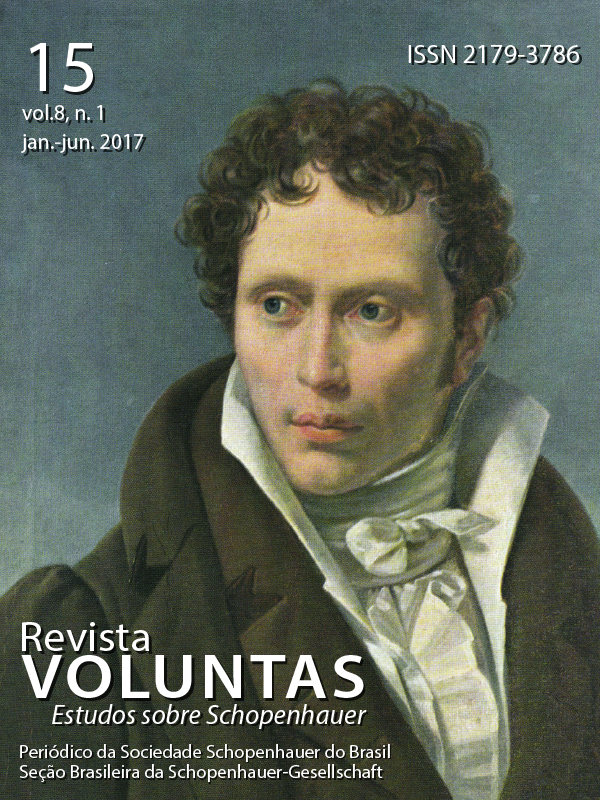The problem of the affection in the post-kantianism and the conception of the empirical intuition in Schopenhauer
DOI:
https://doi.org/10.5902/2179378633696Keywords:
Schopenhauer, Problem of affection, Empirical intuition, Thing-in-itselfAbstract
This article begins presenting in a synthetic way elements of the polemic involving the so-called “problem of affection”, that occurred in the years following the publication of the Critique of Pure Reason. To this end, are briefly reconstituted some Jacobi, Reinhold, Schulze and Fichte’s arguments. This reconstitution serves as the basis for the ensuing presentation of how Schopenhauer historically interprets the problem of affection and, in his way, absorbs its demands in important components of his philosophy, seeking to solve it by his conception of the empirical intuition. As a background, the exposure of this movement makes possible to problematize the self-proclaimed Schopenhauer’s total rejection of the post-kantianism philosophy and, conversely, evinces a central element of the schopenhaurian fidelity to the original project of the critical philosophy.
Downloads
References
CACCIOLA, Maria Lúcia Mello e Oliveira. Schopenhauer e a questão do dogmatismo. São Paulo: Edusp, 1994.
CASSIRER, Ernst. Das Erkenntnisproblem in der Philosophie und Wissenschaft der neueren Zeit, Band III. Berlin: Verlag Bruno Cassirer, 1920.
FICHTE, Johann Gottlieb. Sämmtliche Werke. Erster Band. Berlin: Veit und Comp., 1845.
GIL, Fernando. Recepção da crítica da razão pura: antologia de escritos sobre Kant (1786-1844). Trad. Irene Borges Duarte e Fernanda Portela. Lisboa: Calouste Gulbenkian, 1992.
HARTMANN, Nicolai. Die Philosophie des deutschen Idealismus. Berlin: Walter de Gruyter, 1960.
JACOBI, Friedrich Heinrich. David Hume über den Glauben, oder Idealismus und Realismus. Ein Gespräch. Ulm: Wohler, 1795.
JANAWAY, Christopher. Self and World in Schopenhauer´s Philosophy. Oxford: Oxford University Press, 1989.
KANT, Immanuel. Kritik der reinen Vernunft. Nach der ersten und zweiten Original-Ausgabe neu herausgegeben von Raymund Schmidt. Hamburg: F. Meiner, 1956.
KANT, Immanuel. Crítica da razão pura. Trad. Manuela Pinto dos Santos e Alexandre Fradique Morujão. Lisboa: Calouste Gulbenkian, 2001.
LEBRUN, Gérard. A aporética da coisa em si. In: Sobre Kant (Org. Rubens Rodrigues Torres Filho). São Paulo: Iluminuras, 2001, p. 51-68.
REINHOLD, Karl Leonard. Versuch einer neuen Theorie des menschlichen Vorstellungsvermögens. Zweite Auflage. Prag und Jena: C. Widtmann und J. M. Mauke, 1795.
SCHÖNDORF, Harald. Der Leib im Denken Schopenhauers und Fichtes. München: Johannes Berchmans, 1982.
SCHOPENHAUER, Arthur. Sämtliche Werke (org. Löhneysen) em 5 volumes. Stuttgart/Frankfurt am Main: Suhrkamp, 1986.
SCHOPENHAUER, Arthur. O mundo como vontade e como representação. Tomo I. Trad. Jair Barboza. São Paulo: Unesp, 2005.
SCHOPENHAUER, Arthur. Fragmentos para a história da filosofia. Tradução, apresentação e notas de Maria Lúcia Cacciola. São Paulo: Iluminuras, 2003.
SCHOPENHAUER, Arthur. Sobre o fundamento da moral. Trad. Maria Lúcia Mello Oliveira Cacciola. São Paulo: Martins Fontes, 2001.
SCHOPENHAUER, Arthur. Sobre a filosofia e seu método. Trad. Flamarion C. Ramos. São Paulo: Hedra, 2010.
SCHULZE, Gottlob Ernst. Aenesidemus oder Über die Fundamente der von dem Herrn Professor Reinhold in Jena gelieferten Elementar-philosophie. Berlin: Reuther und Reichard, 1911.
TORRES FILHO, Rubens Rodrigues. O espírito e a letra. São Paulo: Ática, 1975.
TORRES FILHO, Rubens Rodrigues. Dogmatismo e antidogmatismo: Kant na sala de aula. Cadernos de Filosofia Alemã, São Paulo, n. 7, 2001, p. 67-86.
VAIHINGER, Hans. Kommentar zu Kants Kritik der reinen Vernunft. Stuttgart/Berlin/Leipzig: Union Deutsche Verlagsgesellschaft, 1922.
Downloads
Published
How to Cite
Issue
Section
License
The submission of original manuscripts to this journal implies the transference, by the authors, of the copyrights for printed and digital publication. The copyrights of a published manuscript belong ultimately to the author, and only the copyright for its first publication is reserved to the journal. Authors may only use the same results in other publications explicitly indicating this journal as the medium of the original publication.
Licence
Attribution-NonCommercial-ShareAlike 4.0 International (CC BY-NC-SA 4.0) - This license lets others remix, tweak, and build upon your work non-commercially, as long as they credit you and license their new creations under the identical terms.






